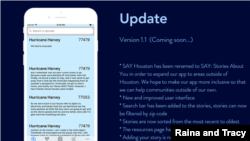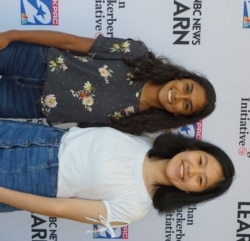Winners are being announced for the 2019 Congressional App Challenge, an initiative taken by the United States Congress to encourage high school and middle school students across the country to get involved in computer science.
The Congressional App Challenge has students designing apps that are then entered in competitions in their congressional district.
More than 10,000 students across 304 congressional districts registered for this year's competition, the fifth year the challenge has been held.
According to the Congressional App Challenge, 223 representatives held app challenges in their district in 2018, which was their previous record.
For this year’s challenge, 2,177 fully functioning apps were submitted.
Texas Duo
When Raina and Tracy are not playing tennis or making art, they are winning their district's Congressional App Challenge.
The duo are now 10th graders in Texas' 22nd Congressional District, which largely covers the southcentral suburbs of Houston, Texas.
Their app, Stories About You (SAY), is a disaster relief app that offers a survey and information on shelters and donations. SAY's main function is to allow children to post their stories, with a no comments feature for safety.
They came up with the app idea after Hurricane Harvey hit Texas in 2018.
"Even though we were not impacted by Hurricane Harvey as much as families in downtown Houston, we still experienced a little bit of that mental trauma from Harvey," Tracy said. "We knew what it was like to be scared and confused during a natural disaster."
Hurricane Harvey was the first Category 4 hurricane since 2005 to make landfall in the United States. The hurricane caused $125 billion in damages and struck the city of Houston especially hard.
Raina and Tracy say the apps ability to allow children to share their experiences with natural disasters can be therapeutic.
Tapping into nonprofits
When the team was making their app, they reached out to nonprofits in the Houston area. Eventually, they partnered with Children at Risk, a research and advocacy organization.
"They told us about some of the problems that they were experiencing. And, so, from that, we were able to expand our app to help more children," Raina said.
Children at Risk now uses the children's stories to humanize the trauma of natural disasters outside of statistics and numbers.
The two girls have not always been fans of STEM (science, technology, engineering and mathematics) or coding.
The two developed an interest in coding while developing a previous version of the SAY app. Raina and Tracy joined a girls coding club and over time gained a passion for it.
Together they created Girls Who Code to encourage other young women in their high school to learn as well.
"We wanted to expose more girls to coding and creating apps that could create change in our community" Tracy said.
In 2016 only 16% of all computer science majors in the United States were women, according to the National Center for Science and Engineering Statistics.
Employment of computer and information research scientists is expected to grow faster than the average of all other occupations in the U.S.
The Congressional App Challenge was started as a collaboration between the United States House of Representatives Congressional Internet Caucus and the non-profit Internet Education Foundation to help make Americans ready for the opportunities in computer science.
"Estimates show potential future STEM jobs don't currently have domestic talent ready to fill it," said Joseph Alessi, director of the Congressional App Challenge Program.
The challenge also has engaged with women and minorities to increase diversity in STEM.
In 2018, the app challenge had a record high of 37% female enrollment. There were also proportionally more minority participants than in Silicon Valley companies.
"It's great that the Congressional App Challenge encourages this kind of passion. Because I know a lot of girls don't have that kind of interest in STEM and it's great to see that there's this kind of competition that encourages that," Tracy said.
"I just think it's amazing to follow in the footsteps of so many others who have done the challenge and to be given the same honor that they were," said Raina "I think that's really incredible."
Members of Congress will announce their district winners by December 31.





